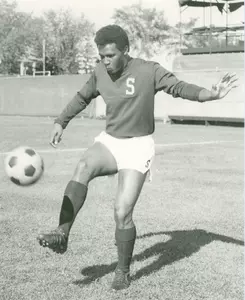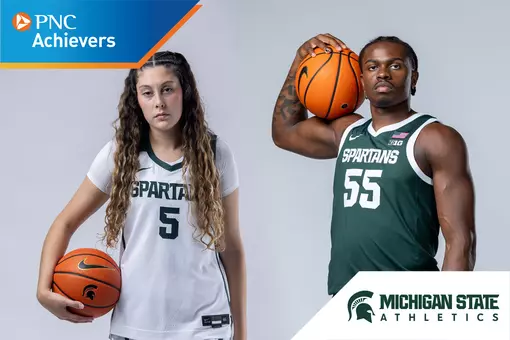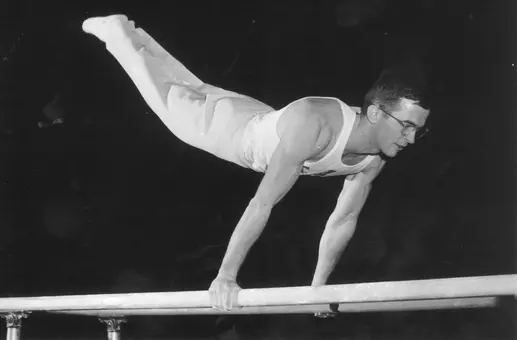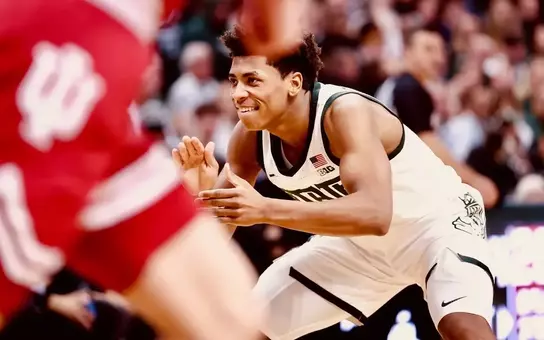Michigan State University Athletics

Trevor Harris: 1960s Soccer Superstar
2/18/2008 12:00:00 AM | General
Feb. 18, 2008
February is Black History Month, and nowhere in major-college athletics is that history richer than at Michigan State University. From Gideon Smith, the first African-American football player at Michigan Agricultural College in 1913, to Steve Smith, an All-American basketball star whose contributions have a major impact today, it would take many months to tell the full story. In a series of Spartan profiles, longtime writer and radio broadcaster Jack Ebling will present some of the greatest of the great in 2008. The second is 1960s soccer superstar Trevor Harris.
TREVOR HARRIS
Memories fade over 40 years. But a few of the best ones, the timeless treasures, grow stronger with each passing season.
When it came to shooting and passing a soccer ball, Jamaican gem Trevor Harris had few peers at Michigan State or any other school. If you listen to those who played with or against him, you would think he scored on every touch.
Not quite, but close enough to help Gene Kenney's powerhouse teams share national titles in 1967-68 with a combined record of 23-1-5. The two-time All-American finished with 48 goals, third on MSU's all-time list, and endless respect.
"Trevor Harris was an incredible player," said former teammate Joe Baum, the Spartans' head coach for 31 years. "He had a combination of speed, skill and scoring drive that was very rare. He reminded me a little of Scott Skiles."
No one on campus has been more competitive than Skiles, a college basketball Player of the Year in 1986. But one conversation would convince anyone that Harris was blessed with the same fire and confidence.
"Guys who say I scored every time exaggerate a little bit," Harris said by phone from sunny Jamaica. "But playing the game was easy for me. I don't want to sound conceited. I just felt I could do whatever I wanted."
He couldn't make the weather warmer. Fortunately, at age 60, he has had nearly four decades to thaw from temperatures he couldn't have imagined.
"It was a real culture shock," Harris said with a laugh. "Remember, I came from warm weather and beautiful sunshine. You can imagine how it felt to see 26 inches of snow on the ground."
The key for Harris was having other Jamaican trailblazers in the MSU program. Payton Fuller was an All-American in 1964. And Tony Keyes, the Spartans' season and career goals leader, earned the same honor in 1968.
"There was a whole line of greats before me," Harris said. "Payton and Tony scored a lot of goals. Tony was the main reason I came to Michigan State. He wanted me there. And I wanted to be there."
Most of the time, that was true. When it wasn't, Keyes made sure Harris had the support he needed. And together, they drove opponents crazy in two sensational seasons on the varsity, combining for 75 goals.
"Tony was one year ahead of me," Harris said. "He played in '66 when I was a freshman. We were both strikers. And Tony was everything to me. If not for him, I would've stayed in Jamaica. We were like brothers."
The first morning after his arrival, Harris left his dorm in a short-sleeved shirt and went to meet his coach, Gene Kenney. Immediately, he realized the difference between being a king on campus and living in gorgeous Kingston.
"I'd never been so cold in my life," Harris said. "It was probably about 60 degrees, but it felt a lot colder than that. And it didn't get much warmer when I was there. I'll never forget the first time I made snowballs."
Kenney was a terrific coach who talked even faster than Harris ran. Their relationship was a positive one, though it got off to a rocky start.
"He was a great person and a great coach," Harris said. "Every day, I want to thank him. But we had a little problem in '67, the first year I could play. I'd made the national team and won at the top level in Jamaica. But Coach Kenney told me he already had an All-America striker in Guy Busch. He said, `I can't play you over him. What would it do to team unity?'"
It helped that unity when Harris slid from center forward to outside left and helped even more when he came to the rescue after Busch injured an ankle.
"We had some agonizing chats," Harris said. "Finally, I told him, `No problem.' Then, Guy's ankle blew up, and I got an opportunity. The first game, I had five goals."
The goals of a team came first. With Harris scoring 23 times as a sophomore and Busch adding 10 more, the Spartans outscored their opponents, 73-11, and finished 12-0-2. They settled a score with Long Island with a 4-0 win in an NCAA semifinal, and then settled for a 0-0 tie against St. Louis to share the championship.
With Busch gone, Harris was the program's No. 1 striker the next two years. He had 15 goals his junior season while Keyes exploded for 28. The greatest 1-2 punch the Spartans have known sparked an 11-1-3 finish. And after a 2-0 semifinal win over Brown, a 2-2 draw with Maryland brought another shared title.
"I was the starting center forward my last two years, first with Tony, then without him in '69," Harris said. "But we were a great combination. We knew exactly what each other would do and when we'd do it. Most of the time, it was a walk in the park."
More like a dead sprint whenever the ball and the goal were in sight. At 5-foot-10, 160 pounds, Harris made up for a lack of size with an abundance of other attributes.
"Being a great goal-scorer is inborn," he said. "You have to love to score. You have to love to get the ball to the back of the net. And you have to create ways to do that. I did it with a very good left foot and a lot of speed."
When he left MSU with a degree in 1970, Harris returned home to Jamaica, played at the highest levels and opened a successful sporting goods store. Roughly 20 years later, he turned to real estate development and did exceptionally well with the Pros of Ironshore, luxury townhouses on Montego Bay.
Harris has seven children, including one who played at Clemson and two who played Major League Soccer, plus three grandchildren. But he hasn't forgotten four fabulous years in East Lansing.
"I've only been back there two or three times," Harris said. "I haven't spoken with Gene in a long time. But Tony keeps me up to date. I know Joe Baum is a great guy, and I wish him all the best with the team. Joe needs to come down here. I'll help him get some Jamaicans up there again."




